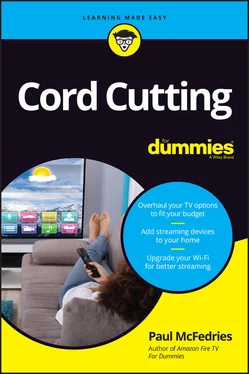Calling the cable company's technical support department is no better an experience than the customer service nightmare I moaned about in the preceding section. First, you have to wait on hold for a very long time. Second, the “technician” (note the sarcastic quotes there) will ask about your problem, and then spend a very long time going through an infuriatingly banal and wrong-headed flowchart-slash-script in an attempt to find a “solution” (more sarcastic quotes).
That approach never works, so now the rep will book you an appointment with an actual technician. Alas, the next available appointment is in two weeks (if you're lucky) and, yes, you'll have to take half a day off work. Oh, and it will set you back $50, $75, or even $100 just for the technician to show up.
As I mention, you can often negotiate a lower cable bill by putting together a bundle of services, packages of content, or both. But there's usually a catch, actually two catches: You have to sign a contract (usually for two years) and the discount applies only for the first year! So you're stuck paying a higher price for the rest of the contract, unless you agree to pay an exorbitant termination fee to opt out. Grrr.
 After signing the contract, you'll receive a confirmation, usually by email. Double-check — no triple -check — the order to make sure you're getting what you asked for and what was promised to you. Cable company sales reps work on commission and will often simply modify orders — while betting that you won't notice — if doing so benefits them.
After signing the contract, you'll receive a confirmation, usually by email. Double-check — no triple -check — the order to make sure you're getting what you asked for and what was promised to you. Cable company sales reps work on commission and will often simply modify orders — while betting that you won't notice — if doing so benefits them.
Some Reasons Why Cutting the Cord Might Not Be for You
This book is about cutting the cord, but I might as well admit early on that there's no perfect solution to going cable-free. My thesis here is that, for most people, saying goodbye to the cable company is a net win. However, a few aspects of cutting the cord fall on the “cons” side of any “pros versus cons” analysis, and one or more of those could be a deal-breaker for you. Let's see.
Your savings might be less than you hoped
Everyone goes into the cord-cutting adventure with big dreams of saving a ton of money every month. And those savings are possible, especially if you embrace free and almost-free services. However, most of the good content sits on the other side of a paid subscription.
You can still save lots of cash if you're prudent with your subscriptions. Unfortunately, many families find that they keep adding new services (particularly for popular content such as Disney, HBO, news, and live sports) and their monthly TV-watching costs rise accordingly.
 You can use lots of tricks and techniques to save money after you cut the cord. I talk about a bunch of these in Chapter 10.
You can use lots of tricks and techniques to save money after you cut the cord. I talk about a bunch of these in Chapter 10.
You might still have to deal with channel bundles
Most of us hate channel bundles because to subscribe to the one channel you want, you also have to get a fistful of channels that you wouldn't force your worst enemy to watch. So now it feels like you're paying the bundle fee for just a single channel. Cue the steam coming out of your ears.
Bundles aren't an issue with subscriptions such as Netflix, where one price gets you access to everything on the service. Unfortunately, far too many streaming services embrace the bundle model and surround premium content (such as HBO) with dreck.
You might still see commercials
For lots of would-be cord cutters, the real incentive is not cost savings but a commercial-free viewing experience. The good news is that most streaming services are on board with the commonsense notion that you shouldn't see commercials if you pay a subscription for the service. Sweet bliss!
However, some free streaming services do show commercials, because they have to pay their bills somehow. And, after all, seeing the odd commercial is a small price to pay for a free service.
 Alas, just because a streaming service doesn't currently show commercials, it doesn't follow that the service will always be ad-free. For example, Netflix, which is currently commercial-free, has run tests in which they show commercials between TV show episodes.
Alas, just because a streaming service doesn't currently show commercials, it doesn't follow that the service will always be ad-free. For example, Netflix, which is currently commercial-free, has run tests in which they show commercials between TV show episodes.
TV watching will become more complex for you
You can bad-mouth cable companies all you want (and I know you do), but they do have one genuinely good feature: simplicity. Sure, you pay a ton of money each month, but in exchange you get all your channels and apps and more in a single package with a single interface.
Once you cut the cord, that simplicity will probably become a thing of the past. I say “probably” because it is possible to create simple cord-free experiences where, say, you watch only live TV or you subscribe to only a single streaming service. But you're more likely to end up with multiple subscriptions on multiple services. That means paying multiple bills, configuring multiple accounts, and learning multiple app interfaces. And you also run smack into a very modern problem: trying to remember which streaming service offers which content!
I wish I could tell you that the cord-free experience is getting simpler, but the opposite is happening. Media companies are falling all over themselves to launch their own streaming services. Whereas a few years ago you might have been able to count the number of streaming services using the fingers of one hand, the way things are going you'll soon need the fingers of every member of your extended family.
You'll use way more Internet bandwidth — and perhaps pay for the privilege
Streaming media comes to you via the Internet, where it's distributed through Wi-Fi to your various devices. You don't normally give it a second thought, but perhaps you should. Why? Because media streams such as movies, TV shows, and music stuff huge amounts of data into the pipe that delivers the Internet to your home. If your Internet service provider (ISP) puts a limit on your monthly bandwidth, blowing through that cap because you binge-watched Better Call Saul may cost you a ton of money.
 If you have an ISP plan that offers unlimited bandwidth (lucky you!), you don't have to worry about any of this because there's no ceiling to go through.
If you have an ISP plan that offers unlimited bandwidth (lucky you!), you don't have to worry about any of this because there's no ceiling to go through.
Your monthly Internet bill will probably go up
When most people are budgeting for a cord-free lifestyle, they usually compare their total cable bill with what it might cost for a few streaming services. That's a legit comparison if all you get from the cable company is cable TV. However, if you get multiple products — such as cable TV, Internet, and phone service — the comparison falls apart because the Internet portion of that bill is almost certainly discounted.
When you tell the cable company that you no longer want their stinkin' cable TV service, the first thing they'll tell you is that your monthly Internet bill will go up because you no longer have a proper bundle of services.
The quality of the streaming video might be poor
Читать дальше

 After signing the contract, you'll receive a confirmation, usually by email. Double-check — no triple -check — the order to make sure you're getting what you asked for and what was promised to you. Cable company sales reps work on commission and will often simply modify orders — while betting that you won't notice — if doing so benefits them.
After signing the contract, you'll receive a confirmation, usually by email. Double-check — no triple -check — the order to make sure you're getting what you asked for and what was promised to you. Cable company sales reps work on commission and will often simply modify orders — while betting that you won't notice — if doing so benefits them. You can use lots of tricks and techniques to save money after you cut the cord. I talk about a bunch of these in Chapter 10.
You can use lots of tricks and techniques to save money after you cut the cord. I talk about a bunch of these in Chapter 10.










